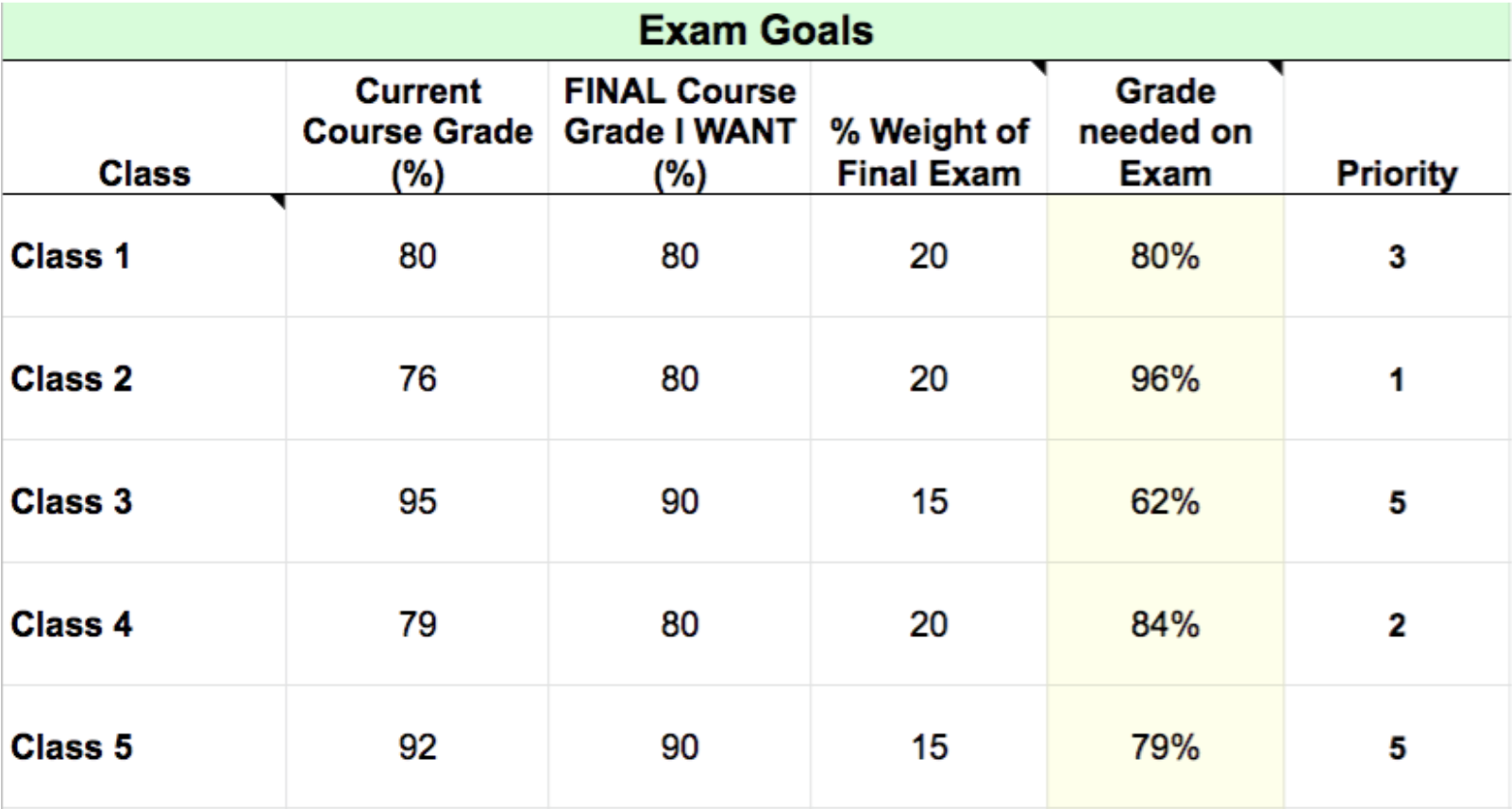As we get closer to exams, students are getting increasingly stressed out. And when teens are stressed about their exams, it can affect everyone else around them, too!
Following the four-step planning process below can help students prepare more effectively for their end-of-semester exams, which will allow them to earn better grades on exams, reduce their test anxiety, and lower their overall stress levels (and yours, too!)
Step One: Set your goals
Setting clear goals for what grades students ideally want to earn on each exam is an important first step, as it will determine the relative priority of their exams and help them identify any goals that might be out of reach.
The key here is to identify:
- The grade they want to earn overall
- Their current grade in the course
- The weight of their exam
…and use this to calculate the grade they need to earn on the exam in order to reach their goal.
For example, if they’re taking 5 classes you might put together something like the following table:

Current grade: At this point, hopefully, they’ve done everything to maximize their grades, (completed all makeup work, turned in missing assignments, etc.) If students don’t have grades posted online, they might need to ask their teachers for their current grade. If all of the existing grades aren’t entered yet, they may want to adjust their current grade up or down a bit to account for any assignments that haven’t been put in the grade book yet but are likely to be entered before the final exam.
Exam weight: Depending on how your kid’s school structures it, final exams could be worth anywhere from 5% to 30% of their overall grade in the class. Students might be able to figure out what the weight of their exam is by looking in their online grade portal or reviewing their teacher’s syllabus, or they can ask their teacher for clarification.
Calculate your goal grade: Based on the exam weight and their current grades, students can calculate exactly what they need to earn on their exams to reach their goal grades. Some students find this is easy to do on a calculator or using a tool like Excel or Google Sheets; others find it’s easier to use a website like https://rogerhub.com/final-grade-calculator/. The nice thing about websites like this is they are also able to help students calculate the grades they need in situations that are a little less straightforward to calculate on their own – for example, when exams are entered as a TEST instead of as a separate “Exam” category.
After they run these calculations, the grade they need on their exam will fall into one of three categories:
- Easy: These exam grades are virtually guaranteed. For example, a student who has a 99% in a class might only need a 65% on the exam in order to keep their grade above a 90% and get an A in the course. While no grade is guaranteed and it’s never a good idea to underestimate an exam, a student who has done well all semester and has never gotten below a 90 on any of their tests or quizzes all year is unlikely to need to study very much for an exam in this category; their time will be better spent preparing for other classes.
- Moderate: These are exams on which students are likely to earn the grades they’re aiming for with a moderate amount of preparation. These are typically classes where the grade students need to earn on the exam is in the same range as the grades they have been earning on most of their other tests and quizzes in the course. Assuming that they continue working hard and do a good job preparing for the exam, they will probably be able to earn this grade.
- Challenging: This is a stretch; typically at or above any other grades they have earned in the class up until this point in the semester. These exam goals are possible, but they are unlikely to happen unless students put in more effort than they’ve invested in any other tests or exams up until this point. They will need a lot of motivation, time, and effort in order to accomplish this goal and may also need additional help from teachers, tutors, parents, and/or friends to pull this off. But if they put the work in, they still have a shot.
- Impossible: They need either HIGHER than 100%, or a grade so high that they know it’s practically impossible. If that’s the case, they can start having conversations with teachers about what they might be able to do to bring their grade up – for example, if there’s any extra credit possible between now and the exam – to try and close the gap as much as possible.
Step Two: Learn more about the exams
There are many important details for each exam your teen should make sure they collect before creating a plan to study. Three of the most important are:
- The date of the exam: Many schools have this information posted online for students several weeks in advance, but some of them don’t put the exam schedule up on their website. And surprisingly, some teachers don’t announce this information in class or put it on their course calendar until the last minute. If it hasn’t been announced yet, it can be worthwhile to ask ahead of time for the exam date to make sure students know which tests they’ll have on which days since this can impact their plan for what to study when.
- What topics will be covered on the exam: Students often assume what sections will be covered without ever asking. The most important thing to find out is whether the exam is cumulative, or if it only covers what they’ve learned since the last test?
- What the format will be (multiple choice, essay, oral exam for language classes, etc): The format of the exam will actually change how students should ideally study for it. Take a History class, for example. Will they need to know a lot of really detailed information like dates, names, and the sequence of events they will need to answer in a series of multiple-choice or matching questions? If so, then the way you’d want to study for this exam would be totally different than if your teacher doesn’t care about details and instead is going to let you choose from a series of essay questions to respond to about the bigger picture concepts and historical trends going on at the time.
Step Three: Collect your study materials
Now that your teen knows what’s going to be covered on your exam, the next step is to actually collect all of their study materials. This is important because once they get started trying to make their exam plan, it’s a little bit distracting if they’re trying to run around and find where their textbook is, or where their notes are. It’s a lot easier if they can go ahead and gather everything together in one place at the beginning.
For example, here is a list of some things it can be really helpful for students to find before they start studying…

- Teacher’s study guide (if one is provided)
- Copies of previous years’ exams (if possible)
- Tests from earlier in the semester
- Quizzes
- Study guides from previous units
- Homework assignments
- Class notes
- Handouts & worksheets
- Textbook (print or online)
- Powerpoint slides (if teachers provide them on their website)
- Flashcards or Quizlet sets (in a folder for each class)
- Link to teacher’s website
- Online websites with practice questions (in a folder for each class)
- Past labs, projects, and papers (if these will be covered on the exam)
A word on past quizzes and tests: These can be really helpful when studying for exams! I highly recommend asking students if they have access to any tests and quizzes they took earlier in the semester, since these questions are often the best clue they have about the types of questions teachers are likely to ask about on exams.
If they are not allowed to keep their past tests, they can at least try asking teachers if they can come in to look over those tests before or after school or during a free period. This won’t allow them to practice re-taking the tests, but will at least give them good clues about the way the teacher formats their test questions, as well as an indication of which topics they have missed questions on in the past and will need to review for the exam.
Step Four: Choose your best study strategies
Unfortunately, most students do not use the best study strategies to prepare for their exams, so the time they spend preparing is not as well spent as it could be.
Many students will think that “studying” for exams means looking through their notes. But not only is this a very boring and ineffective way to study, it can also backfire by creating “illusions of competence” and tricking students into thinking they know the material better than they do. This happens when students look through something familiar and assume (incorrectly) that this means they’ll be able to remember it on the test.
To understand the difference between recognition and recall, imagine you just read someone’s phone number, for example: (404) 801-4891. You could easily skim over this information and get to the end of the paragraph without thinking twice about it. And if someone asked if you understood what you were reading, you’d probably agree that it all made sense. But if you closed your eyes and tried to remember the phone number you’d just read a few seconds ago you probably wouldn’t be able to remember it without going back to study it again. (Try it! I’ll wait…)
The best study strategies students can use are going to be active ways of engaging with the material, either by…
- Creating something new: for example, summarizing their notes or explaining them in their own words, coming up with a mental picture or analogy, creating a mind map or flashcards, etc.
- OR Testing their understanding: for example, by taking a practice quiz or test, having someone quiz them on the material, trying to answer problems in a textbook or study guide from memory, etc.
Ideally, the best study strategies will also be good practice for what is going to be covered on the exam itself. So, for example, if the teacher is going to provide quotes from a book and ask students to identify which character said those quotes, then it would probably be really helpful to create a chart of the characters’ main traits and/or a summary of the key points in the story’s plot, and then test their understanding with Quizlet or online practice quizzes to see if they can correctly identify which character said each quote.
Still not sure what will count as a good study strategy? Here’s a clue: if students are bored when they are doing it, it’s probably not a good strategy! Try something more creative and/or challenging instead.
Put it all together
Once your teen has prioritized which classes are most important to study for, learned exactly what will be covered on their exams, gotten their materials together, and identified the best study strategies to use for each class, it will be much easier for them to create an effective study plan they can use to earn the exam grades they want, without all the stress and overwhelm.
How is your teen’s exam preparation going so far?
Feel free to email me anytime to let me know what’s working well for your teen, or what they might be struggling with!


Join 11,000+ parents helping their students earn better grades with less stress!

About The Author
Dr. Maggie Wray is a certified ADHD Coach & Academic Life Coach with a Ph.D. in Neurobiology and Behavior from Cornell and a Bachelor’s degree in Astrophysics from Princeton. She founded Creating Positive Futures in 2012 to help high school and college students learn how to earn better grades with less stress. Her team of dedicated coaches is on a mission to empower students to develop the mindset, organization, time management, and study skills they need to achieve their goals.
Related Posts
Other Posts You May Enjoy
How to finish the semester strong
Students' grades are the most important factor colleges consider when making admissions decisions.So, with the end of the semester approaching, how can you make sure your student is finishing the semester with the best grades they can? At this point in the semester,...
Why it’s hard for students to “just turn in” missing assignments, and how to get them unstuck
With the end of the semester on the horizon, many students may feel overwhelmed by low grades or feeling behind in some of their classes. As a parent, it can be stressful to see that your student has overdue work, or get notifications from their teacher that they’re...
Why the most common study method is the least effective…and what to do instead
Re-reading class notes and/or textbooks is one of the most common methods students use to study for exams. Unfortunately, research also shows that this is one of the least effective study methods for improving students’ performance on exams (Dunloski, 2013)....




